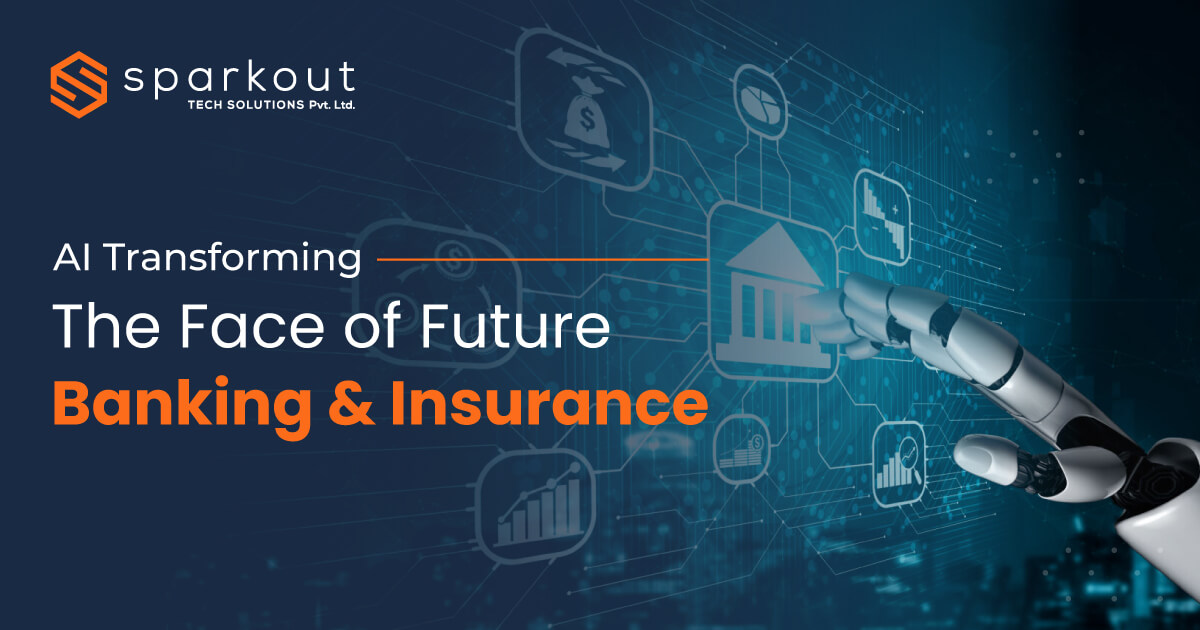Introduction
AI is gaining traction in various industries and has already cemented its place in finance. Artificial intelligence in banking and insurance industry is transforming the system, offering customers better and more targeted products and services. The prominent use of ai in banking sector is touching its heights with its application and benefits.
The implementation of artificial intelligence in insurance industry will naturally transform industry workflow and other financial services in the coming years, impacting customer service, fraud mitigation, lending, credit scores, and investment advice with improved outcomes.
Big tech giants like Mark Zuckerberg, Elon Musk, and Bill Gates have given life to AI. Use of AI tools and apps in determining customer preferences in their business. The use of ai in banking and insurance industry is changing the landscape of financial services and will no doubt continue to do so in the future.
How Is AI Shaping the Financial Sectors?
The banking sector has undergone an amazing digital transformation in recent times. It may be surprising given the fact that financial institutions are associated with stiff approaches and structures, mainly because of questions about security that are often raised. However, looking at a wide angle, they have made significant progress in a short period. For example:
The AIs' predictive models are the use of ai in banking to identify fraud before it happens. Deep learning can predict market volatility and trade accordingly in milliseconds. Natural language processing (NLP) can answer basic questions or complete complex transactions. Machine learning can predict customer preferences and suggest products accordingly without making the same mistakes as a human would.
Various AI flavors that enhance Banking/Insurance services
Customer Service and Marketing.
- Chatbots: Self-learning programs for intelligent conversations with humans via chat or audio.
- Robo-advisors for financial products: Online platforms that use algorithms to provide financial advice and automated portfolio creation.
- Personalized financial services: Clients are given personalized attention and recommended stocks regardless of their risk severity.
- Smart wallets: Adding intelligence to mobile wallets to provide smart services like chat, ticket booking, and utility bill payments.
- Emotion AI: This technology enables machines to recognize human emotions using advanced facial and voice recognition.
Enhance Security and Compliance
- Intelligent QRC: Ensures that no document is lost when filing something and mitigates risk by monitoring customer behavior.
- Monitoring Compliance: AI can scan long documents and flag potential problems in seconds.
- Fraud Prevention & Detection: Reduces the need for human intervention to detect and prevent security attacks.
Improved Back-end BPM
- Robotic Process Automation: The use of software robots is ideal for undertaking high-volume, back-office processes, and repetitive tasks to save time, and increase efficiency and accuracy.
- Insurance underwriting: AI in the insurance industry implements faster and more accurate risk assessment and pricing to calculate risk exposure, and determine the premium a customer must pay.
- Algorithmic trading: AI is used for high-frequency trading that takes inputs from multiple financial markets to make decisions in milliseconds.
- Investment research: Investors can get clear guidance from AI on stock-picking decisions. It will help companies in their research and portfolio management.
- Human Resources: AI can solve and save hiring managers by interacting with new recruits, shortlisting resumes, pre-screen candidates, etc.
Prerequisites for Implementing AI
- Digitization of data: AI in banking industry, financial services, and insurance data, it must first be digitized and searchable.
- Centralized and filtered data: Companies planning to implement AI should centralize their data from different servers and clean it before applying AI to it.
- Validate algorithm results: Algorithms used to process data must be clean and continuously monitored to provide correct results.
- Proper API standards for data sharing: It is very important to ensure that the correct API standards are used so that data is not compromised. Only then can data sharing and integration be done properly.
Benefits of AI in the Insurance/Banking Sector
Improves customer experience
Financial institutions such as banks, insurance firms, etc. are increasingly using AI to improve customer experience. One of the prominent applications of AI, chatbots can provide 24/7 customer support and answer questions about products and services.
Cost reduction
AI reduces costs in some ways. Like automating repetitive tasks and detecting and preventing fraud. For example, banks are using AI-powered chatbots to handle customer service inquiries, freeing up human employees to focus on more complex tasks.
Enhancing decision making
Better decision-making leads to efficient business operations. AI helps financial institutions make more educated decisions in a number of areas. AI allows institutions make better credit decisions by providing loan officers with the information they need to make informed decisions.
Financial Planning and Analysis
The potential benefits of AI in the bank and insurance sectors are prominient. By automating repetitive, low-value tasks, AI can help financial institutions improve efficiency and focus on higher-value activities.
Improved functionality
The financial sector is rapidly adopting AI technologies to improve operational efficiency. AI can identify and flag errors in financial documents, speed up the loan approval process and automate customer service tasks. Financial institutions use AI to detect fraudulent activity and protect against money laundering. In this way, AI benefits the banking and insurance sector.
Increased sales and revenue
AI in banking sector, Banks, insurance companies, and individuals must control and regulate the flow of money and deposits and provide essential services. The financial sector is constantly evolving and innovating to stay ahead of the competition and meet the ever-changing needs of consumers.
Application & Use-cases of AI in the Banking & Insurance
Personalized banking services
True customer service is when you provide personalized service or products. More personalized customer service allows us to get to know our customers better and give them what they need. By understanding a customer's individual needs and preferences, AI-powered chatbots and virtual assistants can deliver a more tailored customer experience.
Fraud detection
Critical analysis of patterns in customer data can help banks or other financial institutions detect fraud. By searching for anomalies such as account activity, transaction history, and social media activity, AI can flag fraudulent activity for better investigation.
Loan Risk Assessment and Credit Scoring
Statistical models and supervised learning can help banks or insurance companies automate the loan risk assessment process and credit scoring, making the processing of loan applications much faster and more efficient. Banking institutions can train a unique algorithm using historical data of customers who have defaulted and those who have not.
Predictive modeling for increasing bank income
Apart from identifying risk and detecting fraud, predictive models can be used to learn existing customer behavior data to come up with more relevant cross-selling offers for a particular client. With thorough segmentation of the dataset and market basket analysis, suggestions can become more accurate, leading to a spike in sales.
Facial recognition for frictionless payment
One of the most important and controversial applications of AI in banking industry is facial recognition, which was mainly developed for payment purposes. The operation is simple, the payment terminal scans your face and sends its template to the interpreting device which compares it with the verified template from your bank.
Better customer service
Personalization can positively enhance the customer experience. Virtual assistants can solve problems of varying complexity. VA analyzes account details, and demographic and behavioral data to stay one step ahead and provide the most accurate solutions.
Future of AI in Banking & Insurance
The future of sectors like banking and insurance is very inspiring and efficient with the excellence of innovative technology like AI. With the rapid growth of Artificial intelligence in insurance sector and banking are looking to adopt AI in various ways to improve business operations and better serve their customers. Here are some eloquent ways AI is expected to impact financial services in the future.
Better fraud detection:
With the encroachment of frauds on the Internet, operations in finance need to be more secure against them. AI can detect and block financial institutions more effectively. Machine learning algorithms can be used to identify patterns of fraudulent behavior and eliminate them.
Automated Financial Advisors:
Often we make wrong decisions because we do not get the right financial advice at the right time. However, AI provides automated financial advice to consumers. Robo-advisors can make portfolio recommendations based on the client's risk tolerance and investment goals.
Magnified Risk Management:
Risk management is a major challenge faced by banks and insurance companies. Risks are often not properly managed. Implementation of artificial intelligence in financial institutions facilitates the risk management process more effectively. The best example is AI's machine learning algorithms that help identify risks and opportunities in real-time.
Improved Lending Decisions:
It is difficult to identify any financial institutions like banks and insurance companies that are lending to the right people. It is not easy to collect their personal information so quickly. But AI can. By assessing a borrower's creditworthiness, AI can help financial institutions make better lending decisions using data.
New products and services:
Any organization anticipates the development of new products and services, creating new products to meet the needs of customers or business operations. AI-powered products like robo-advice platforms, virtual bank tellers, chatbots, and smart advisors are expected to disrupt the traditional banking sector in the next few years.
Wrapping Up
We can conclude that many changes in AI in banking sector and insurance sectors are the result of the development of AI. We need to prioritize potential applications according to the business value they create. From decision-making processes through forecasting to customer experience, the impact of AI is visible in various areas of the sector. So AI can cut human interaction in half.
In the next era, the rapid advancement in technology and the penetration of AI will cause disruptive changes in banking and insurance firms. AI-based carriers will use new technologies to create innovative products, transform knowledge with insights from new data sources, streamline processes, reduce costs, and exceed customer expectations for personalization and dynamic adaptation.
 Translate
Translate


















Author Bio
Sivabharathy
Lead Project Manager
Sivabharathy is a technical architect, technology enthusiast, and voracious reader. His visionary perspective has earned him opportunities to work with innovative projects in the computer software industry. He is an expert in PHP, JavaScript, NodeJS, Angular, Ethereum, Web3, Product Development, and Teamwork.